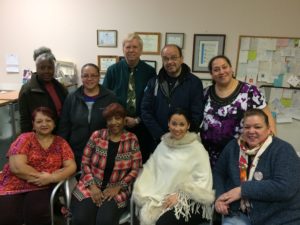Unified Homeowners of Illinois Federal Credit Union
Chicago, IL
 Unified Homeowners of Illinois Federal Credit Union had a specific goal upon establishment in 2006—to provide any and all financial services pertaining to owning a home. It was during this time that founder and sponsor Thomas O. Walker identified a problem in the Chicago area—home equity loans and lines of credit. Low-income individuals were using home equity loans and lines of credit as ATMS, many not comprehending how easily they were falling into a cycle of debt.
Unified Homeowners of Illinois Federal Credit Union had a specific goal upon establishment in 2006—to provide any and all financial services pertaining to owning a home. It was during this time that founder and sponsor Thomas O. Walker identified a problem in the Chicago area—home equity loans and lines of credit. Low-income individuals were using home equity loans and lines of credit as ATMS, many not comprehending how easily they were falling into a cycle of debt.
“These individuals had trouble getting small-dollar loans just to keep up with maintaining their homes,” explains the credit union’s manager Teresa Villalobos Rosado. “If something broke, they either had to tap into their equity or were forced to seek out a payday loan. And then they’re really stuck.”
Unified Homeowners wanted to be the place their community could turn to for safe and affordable smaller loans, even with less than perfect credit. Eventually, their offerings grew to include things like certificates of deposit, Christmas and vacation club accounts, notary services and educational programs.
“Community members often don’t know how important it is to understand budgeting and how to improve their credit scores,” Rosado says. “We want to help educate them.”
A small credit union with big plans
Education is a big focus for Unified Homeowners in 2022. They plan to allocate grant money toward establishing more formal education programming using Pathways to Financial Empowerment. Inclusiv and Neighborhood Trust Financial Partners launched Pathways in 2015 to help credit unions deliver consistent, best-practice financial counseling and coaching to low-income and underserved people. The program has achieved strong impact results to date.
The credit union was also fortunate to receive a grant through the CDFI Rapid Response Program—relief funds established in response to the COVID-19 pandemic.
“We have a lot we hope to accomplish—different ideas to help our members overcome their situations and learn and get into a better place,” Rosado says.
As the credit union moves toward more online services, implementing cybersecurity tactics will be another big focus. An app was the first online tool the credit union put into place for its members to access basic things like account balances and electronic statements.
“As we move from only having informational content online to being able to offer banking services and education on our website and apps, we want to make sure we are doing that safely,” she says. “Keeping our members safe is a big priority.”
Silver linings to the pandemic
 Like most, the community that Unified Homeowners serves had its fair share of struggles during the pandemic. But Rosado acknowledges that not only could the impact have been worse, there were actually some opportunities for growth despite the challenges.
Like most, the community that Unified Homeowners serves had its fair share of struggles during the pandemic. But Rosado acknowledges that not only could the impact have been worse, there were actually some opportunities for growth despite the challenges.
Initially there was the concern of unemployment and falling behind on loans—and of course some businesses were forced to close or reduce hours. But Rosado explains that the community in general was fortunate because many jobs were considered essential.
“All I can say is we were blessed,” she says, explaining that most people didn’t fall behind on loans.
The credit union did put grant money toward helping with late fees, forbearance, and some forgiveness of small dollar loans—but one of the biggest roles they played was unexpected.
“What many people really needed from us was just to listen,” Rosado recalls. “Members called and we listened to what their situation was and how we could help. People needed an ear especially when stuck in their homes. I feel like we became counselors during the pandemic. That’s what people needed.”
A silver lining, Rosado says, is that many people realized they need to be prepared for the unexpected. She says they saw savings go up because members want to ensure they are never caught off guard again.
The role of credit unions in improving racial equity
Despite many Unified Homeowners members keeping their jobs during the pandemic and even setting aside savings for the next emergency, theirs is not unlike many other African American communities still in the search for racial equity and sustainability.
Rosado says that the credit union industry plays a big part in helping to equalize that playing field. And education, she says, is the number one way to do that.
“It’s about teaching members to be better consumers,” she explains. “We can teach them how to improve their credit scores, which can lead to them buying a car to get to work, purchasing a home,” she says. “All of these things go toward helping improve their community as a whole. That’s our biggest goal.”
People helping people
It may be the credit union industry’s philosophy, but it’s also Unified Homeowners’ practice. They are there to help their members, and in turn their members are better positioned to help the community.
There is no better example of this than the credit union’s own Robbie Anthony. A founding member and now also a board member, Anthony was a home child care provider for over 20 years before recently retiring. With 98% of the children who she cared for coming from low-income families, loans through Unified Homeowners became essential to her survival and theirs.
“I would transport the kids and take them on field trips,” she says. “But I needed a vehicle to do that, and the credit union was there for me.”
Her first personal loan through the credit union enabled her to purchase a vehicle for her business, but that’s not where their assistance ended. Other loans helped keep her door open and food on the table for so many children.
“It was always a struggle,” Anthony recalls. “We would feed them two meals and a snack each day. If we didn’t have that, would they eat? No, they wouldn’t. Being able to get loans from the credit union has been wonderful. It’s been everything.”
Anthony established the Greater Austin Child Care Providers Association and offers a Unified Homeowners membership to any providers who join.
“The credit union is like my family,” she says. “They are my sisters and brothers. And it’s like that for my members too. Child care is our business—it’s what we do. They help us sustain our businesses. There is nothing more important to us.”

